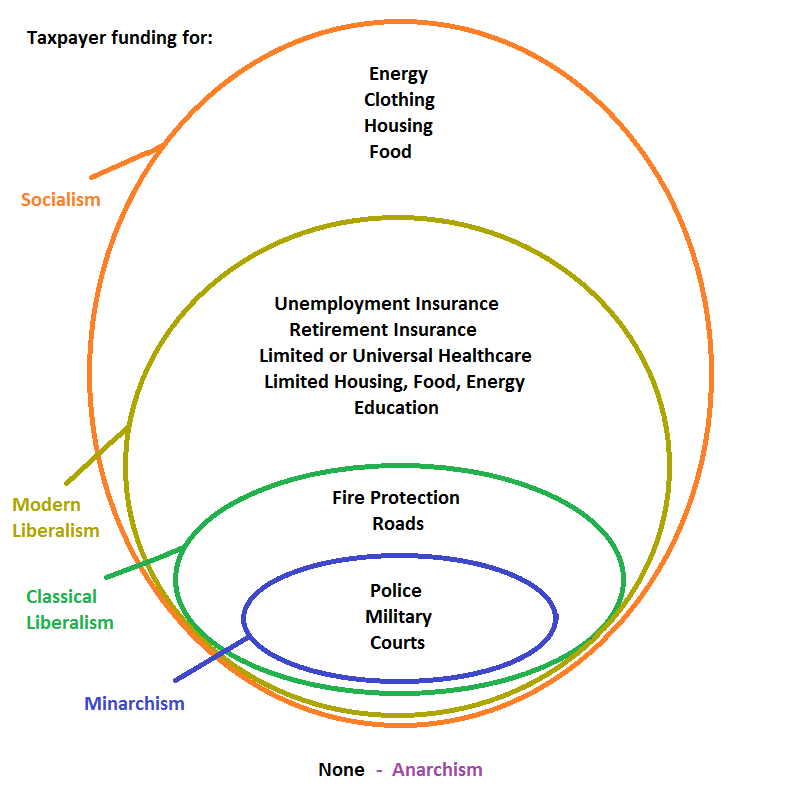Why I am a Minarchist and not an Anarcho-Capitalist

Tags: minarchism versus anarchism minarchist anarchist
Why I am a Minarchist and not an Anarcho-Capitalist published by The 1st Amender
Writer Rating: 5.0000
Posted on 2020-03-09
Writer Description: Loves to blog and debate
This writer has written 211 articles.
It is quite common that I get into a debate or discussion with other Libertarians. I find that many Libertarians have very different viewpoints on how they view the ideology of Libertarianism. One of which, and probably the most pure and extreme version of Libertarians are the Anarcho-capitalists. I fully understand Anarcho-capitalists and considered the viewpoints. I've read the Rothbardian understanding; I've read the manifestos; I've read the concepts; I've even accepted some of the arguments such as a fully privatized system to police.
The part that gets me thinking of contradictions of "the most pure version of Libertarianism" is the very thing they cling to for dear life: economics itself. With enough economic reading, every studied economist understands and acknowledges the form of market failure. This isn't some leftist anti-bourgeois policy and heavily discredited such as "labor theory of value" but very real economic circumstances that literally create a worse quality of living (I.E. failure to trade effectively).
A perfect example of this would be the drug trade. If all drugs were made 100% legal, there would of course create a negative externality ( A negative externality is a cost that is suffered by a third party as a consequence of an economic transaction. In a transaction, the producer and consumer are the first and second parties, and third parties include any individual, organisation, property owner, or resource that is indirectly affected.) of people who abuse the freedom of using drugs and ultimately find their lives in a loop of "get more drugs, which leads to pleasure, which leads to wanting more drugs, which leads to poverty, which leads to stealing revoking autonomy, to get more drugs, which leads to pleasure..."
So how is this curbed? In all societies, it has been curbed with the power of the state. For example, Portugal which made all drugs legal. Additionally Portugal created rehabilitation centers which are funded by the government to assist this negative externality. It doesn't make sense that private donation (via the holy purist an-cap way) would work because it could easily be seen as giving money to people who do not better their life. There is little to no incentive for someone in power to donate to these causes unless it directly affects them.
Though, the creation of a rehabilitation center would be far better, far more Libertarian than the drug war state that we have created. We've created a system much larger, spends more money, more coercion, and leads to less results. It has even gotten to the point of stealing people's property if they illicit in this unwanted behavior by the government. This leads to an inherently corrupted local officials that literally keeps down people in a minority class and a monetary class.
There are many examples of market failures, this being just one of them that can be solved with "a small but reasonable amount" of coercion of the state. The question is, how much coercion is society willing to allow? Could the coercion itself actually be a better solution than if there wasn't coercion? According to my example of the drug war, it would be! So I can start to see examples of government that aught to exist knowing that THEY DO coerce, but that the coercion itself is a better solution than having no coercion at all.
An Anarcho-capitalist would exclaim: "No amount of coercion is justifiable. Doing so in the name of the state is a literal revocation of a person's bodily autonomy." In which case, this political extremism can lead to an impossibility where most people will place the Libertarian philosophy into this fringe group that could never achieve an impossibly high standard such as this. Not only would it be impossibly difficult to achieve this, even if this would be achieved, would it result in a better society?
Can we think of an instance where the coercion itself is a better result than if there was no action? If there was no action, does this count as an action? The answer to the first question itself is, and if you believe or came to the same conclusion as my "drug legality example", a resounding yes! You can think of instances of market failure that must be curbed in the name of preserving people's autonomy to improve the quality of living for all those around us.
One classic Rothbardian example, which I consider quite egregious, and I feel that most people would disagree with is his "court example". For those who haven't read this portion of Rothbard — he basically treats court systems as a business. Basically you want to have a society that hires a court system to handle disputes, and if they do not like the policies of that court, then they purchase another court system, similar to how you buy shoes or purchase any other product.
However I find this example to be very difficult to swallow. In our current USA system, we have a hierarchy of law. This means that if a law is placed at a federal level it will overturn any contradicting law under it, such as a state law. The hierarchy of law from the bottom up goes as follows:
-
Business bylaws
-
City laws
-
State laws
-
Federal laws
-
Supreme court ruling
-
Constitution
This means that if a federal law dictates: "You cannot discriminate based on race, color, ethnicity, creed..." there can be no state, city, or business bylaw that can contradict this. This creates a level of consistency in society that promotes, not denies, trade. If economists understand that "trade=good" then perhaps we can look at the minor, but albeit powerful, and autonomy promoting laws are ultimately, justifiable and good.
TL;DR: Ancap is too extreme and unrealistic.
Sources: self-written
You have the right to stay anonymous in your comments, share at your own discretion.


